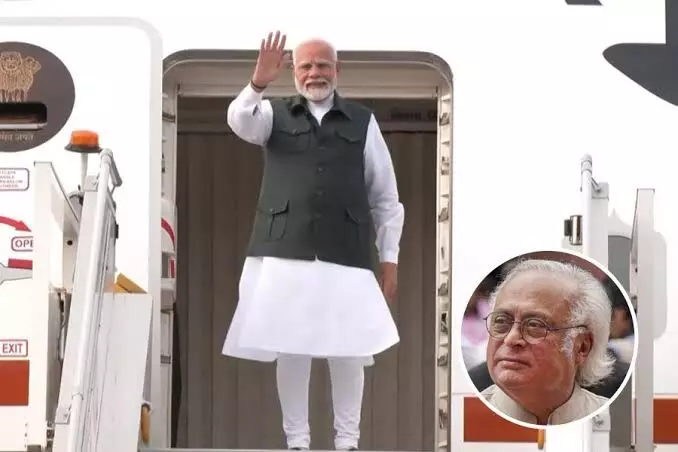Frequent Flier or Escapist? Congress Slams PM Modi's Foreign Tour Amidst Domestic Crises

As Prime Minister Narendra Modi prepares to embark on yet another high-profile international visit—this time spanning five nations in eight days—the Congress party has launched a blistering critique, branding him the “Frequent Flier PM.” With pressing national issues looming large, the timing of the trip has reignited debates over priorities, accountability, and the optics of global diplomacy at the expense of domestic governance.
The tour, scheduled to commence on July 2, includes visits to Ghana, Trinidad and Tobago, Argentina, Brazil, and Namibia, with a significant stop at the 17th BRICS Summit in Brazil. While the Ministry of External Affairs defends the tour as a strategic move to deepen South-South cooperation and global leadership, the opposition views it through a sharply different lens.
Congress general secretary Jairam Ramesh articulated the party's concerns on social media, accusing the Prime Minister of using international travel as a political shield. “When the going gets tough, the self-styled toughs get going,” he quipped, before describing Modi’s itinerary as a "Super Premium Frequent Flier PM's jaunt."
At the heart of the Congress's critique lie four critical domestic challenges that, according to them, Modi is actively avoiding.
The first is the continuing humanitarian and law-and-order crisis in Manipur, a state that has been mired in ethnic violence, displacement, and social collapse for over a year. Despite the severity of the situation, Modi has yet to visit the state. His silence has only amplified the sense of alienation and abandonment felt by the residents. The so-called “double engine government”—a term the BJP has popularized to indicate synergy between state and central rule—has reportedly failed to restore order or provide meaningful relief. The Congress argues that the Prime Minister's non-engagement reflects an alarming neglect of federal responsibility.
Second is the matter of Operation Sindoor, an ambitious military action launched against entrenched terror groups. While official narratives have framed the operation as a tactical success, media reports and alleged leaks from defence circles suggest otherwise. Ramesh cited defence sources indicating that India suffered reverses in the first two days of the operation, attributed partly to flawed strategic directions emanating from the top. Though these allegations remain contentious, they raise valid questions about transparency and civil-military accountability. Notably, India’s defence attaché to Indonesia, whose statements reportedly sparked the controversy, has since claimed his remarks were “quoted out of context”—a common diplomatic retreat that fails to fully extinguish the fire it started.
The third issue flagged by the Congress is India’s tepid response to claims repeatedly made by former U.S. President Donald Trump, who has stated in multiple public addresses that he brokered a ceasefire between India and Pakistan, using trade negotiations as leverage. These claims, if true, hint at a troubling scenario where a foreign leader influenced India’s foreign policy in sensitive conflict zones without parliamentary oversight or public discourse. Modi’s silence, Congress argues, either signals complicity or weakness—both unacceptable in matters of national security.
Fourth and perhaps most concerning is the failure to apprehend terrorists involved in the Pahalgam attack, even after 70 days. Intelligence inputs suggest that the same group may have orchestrated earlier attacks in Poonch (Dec 2023) and Gagangir and Gulmarg (Oct 2024). This inability to bring perpetrators to justice calls into question the robustness of India's counter-terrorism machinery under Modi’s leadership. In a country where national security is often politically weaponized, the failure to deliver real results, even as the ruling party boasts of muscular policy, is a contradiction that cannot go unnoticed.
The timing of the foreign tour makes the optics even more problematic. As the country faces internal strife and unanswered questions about security failures, the Prime Minister will be seen participating in multilateral summits and signing diplomatic MOUs abroad. Even Modi’s critics concede that foreign policy is one of his strong suits, but they argue that it must not come at the cost of addressing burning domestic issues.
According to a 2023 report by Factly, Prime Minister Modi has made over 140 international trips since 2014, costing the exchequer more than Rs. 2,000 crore. While international diplomacy is crucial, especially in a globalized economy and a multipolar world order, critics argue that the frequency and scale of these visits often appear out of sync with India’s ground realities.
In contrast, multiple opposition leaders, including Congress chief Mallikarjun Kharge and Delhi CM Arvind Kejriwal, have highlighted how Modi’s absence during national emergencies—from the Delhi riots in 2020, the second COVID-19 wave in 2021, and now Manipur in 2024–25—suggests a pattern of avoidance.
The political optics are clear: for a leader who prides himself on being a "man of action," selective silence and absence during crises leave behind a trail of unanswered questions. While jet-setting across the globe offers Modi a stage to reinforce his strongman image, the “frequent flier” label risks becoming an emblem of escape rather than engagement.
In a democracy, optics matter—but substance matters more. And right now, the substance of leadership is being questioned not in the capitals of the world but in the valleys of Manipur, the security posts of Kashmir, and the minds of citizens waiting for real answers.
If Modi’s foreign visit is part of a broader diplomatic vision, the country deserves to hear how it aligns with immediate national concerns. If it is merely a diversion, as the Congress alleges, then India must ask itself: is this the leadership we need, or the one we were sold?
